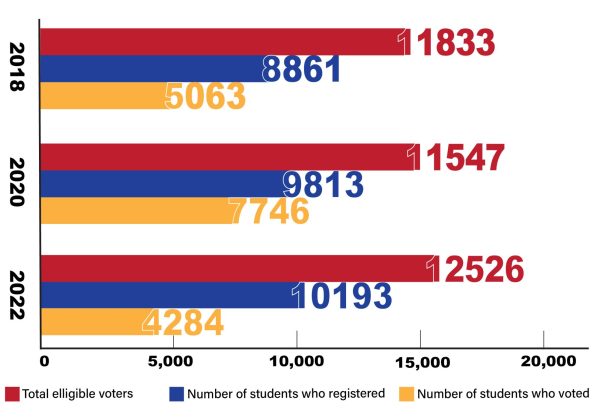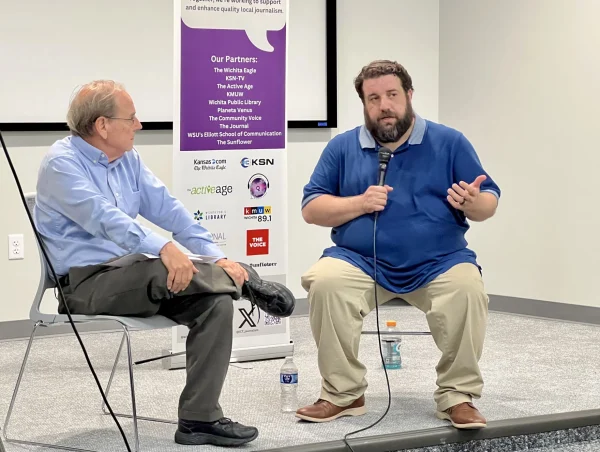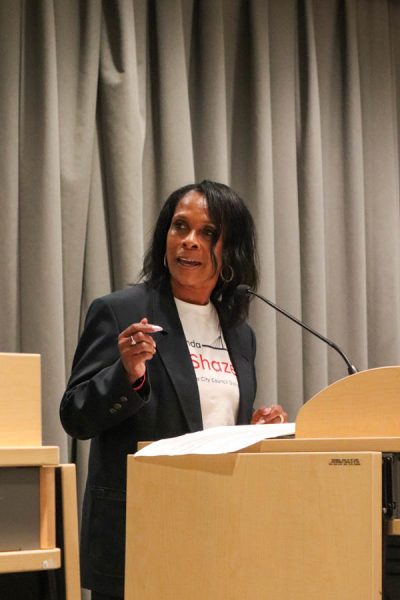Student Government Association passes resolution opposing the lowering of concealed carry age, citing finance and safety concerns
The Rhatigan Student Center on March 23, 2020.
The Kansas House is moving forward with a bill that would lower the concealed carry age from 21 to 18. At the same time, the Student Government Association passed a resolution discouraging it.
The resolution, which passed with a 26-11-0 vote, stated that the lowering of the concealed carry age would financially affect the university.
“This change would cause a significant financial burden on the university because this would require significant safety infrastructure, especially in our housing,” Senator Ella Perkins, who was one of the authors of the resolution, said. “That might mean metal detectors, that might mean armed security personnel 24 hours a day, that might mean gun safes.”
“With the current concealed carry age requirement at 21, the majority of our campus is not allowed to carry concealed weapons … by changing this to 18, the chance or some sort of safety incident occurring exponentially increases.”
The resolution passed with a significant amount of debate time between the senators.
Senator Calvin Pomeroy said that the passing of the resolution would cause harm to minority populations.
“Gun control legislation has roots that started with the formation of the KKK with their attempt to disarm free slaves and Jim Crow laws criminalized black people to defend themselves,” he said. “Gun control laws have been used to further exploit people of color.”
“There is statistically no conclusive results that show concealed carry increase violence of crime, and the assertion that made in the resolution as it puts students in further danger is not based in statistics and it’s not necessarily made in good faith,” Pomeroy said.
“The push for gun control completely ignores the necessity for exploited communities to practice self defense.”
In response to the funding issue, Pomeroy argued that the university could find that money elsewhere.
“I understand completely the justification to potentially shift that burden of cost to the students … but I would rather spend time lobbying on the backend to find that money elsewhere and protect the student rather than not push for this because we’re worried about finding ways of finding money,” Pomeroy said. “We spent the last year in a pandemic undergoing mass protests against police brutality, and to act like that’s not a real issue and that we’re not literally protecting people with this is acting like money is more important than black lives.
Senator Crystal Zacarias Wilson argued that the resolution would not only affect the university population, but the state of Kansas as a whole— Including adult campus visitors.
“Just because we have a lot of police presence on campus doesn’t mean that some individuals don’t feel the need to carry in general,” Zacarias Wilson said. “This law isn’t just about universities in Kansas, I think it’s important to remember this is about all adults in Kansas.”
Freshman Senator Emily Smith said she believes that more concealed carrying on campus could lead to safety incidents.
“I think people should be allowed to carry on campus, however, I do not think that anyone should be allowed to concealed carry,” Smith said. “I believe it’s unnecessary, I believe it’s a great way for people to enter buildings without metal detectors and cause harm to other people.”
Senator Grant Day said that even though he is not a gun owner, he believes that young college students should have a means to protect themselves on campus.
“The fact that an 18 year old cannot bring a gun on campus is really an assault on our most vulnerable populations here,” Day said. “If you’re walking across campus alone, and you’re not allowed to have a weapon, you’re more vulnerable, which is a fact. You can’t consider yourself safe without being comfortable with a weapon sometimes … I just strongly feel people should have the right to defend themselves if need be.”
Senator Perkins argued that there are other ways of self-defense women could utilize that wouldn’t require guns.
“As a woman, I have other means of protecting myself,” Perkins said. “There’s tasers, there’s pepper spray, there’s countless things you can have … I would personally feel exponentially more safe if in fact I knew that there could be hundreds if not thousands of people around me who had weapons.
“I’ve talked to dozens and dozens and dozens of women on our campus in anticipation of this bill and they’ve all expressed the lack of safety they would feel.”
Senator Naramore-Winfery cited suicide as another reason why the bill was alarming.
“Suicide is the second leading cause of death for the age 15-24 age group, and another statistic … is that the most common method of suicide in Kansas is by firearm,” she said. “My experience living on campus last year is that suicide was an issue … I believe having firearms being available in housing and residence life is another safety issue with the person themself.”
EDITOR’S NOTE: The printed version of this story incorrectly stated the dates in which the Kansas House moved forward with the bill. This version has been fixed to reflect the correct date.

Lindsay Smith is the former editor-in-chief and newsletter editor for The Sunflower. Smith was a journalism major at Wichita State with a minor in creative...











